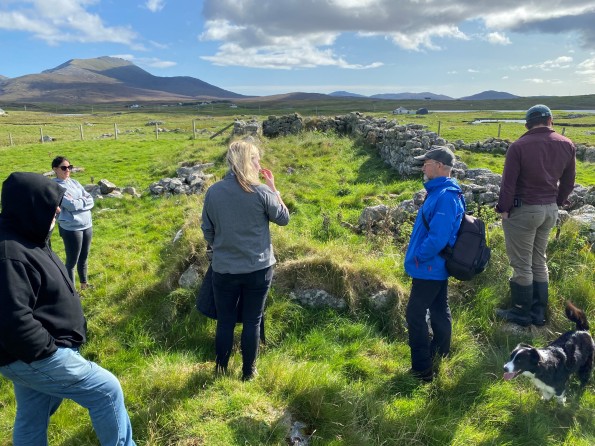Island Voices “make sense”
As we move from 2023 to 2024, Island Voices’ “coming of age” since the project was first mooted 18 years ago in 2005 has already been marked. Followers on Facebook or Twitter will also have noticed our recent “autumn season” of retrospective re-postings of some of our earlier videos from the original Series One and Two. It’s been heartening to see the sudden bursts in YouTube metrics as we re-draw attention to examples of our earliest work, peaking with close to 1200 hits in one single day in November.
A quick analysis of Facebook “likes” (including other positive reactions) may also be instructive, for example in comparing the sixteen videos that form the Gaelic section of Series Two Outdoors, as each was separately highlighted from 2nd November into early December. With overall positive reactions just on our own page totalling over 1,000 during this period – averaging about 63 per video – there was an interesting split between the introductory “teacher talk” documentaries and the “authentic speech” interviews with community members. The documentaries averaged 35 “likes” whereas the interviews pulled in over a mean 79 per video, with the top three scoring 253, 197, and 97 positive reactions respectively, all with senior community members who, sadly, have now passed on since making their recordings.
In a previous (2020) post on “Gaelic virality” we compared hit rates on WordPress, following Facebook shares, between local Hebridean and more widely dispersed Gaelic interest groups (including learners). But this time we simply posted directly on our own Facebook page and shared just with the Scottish Gaelic Duolingo page in each case. It’s a matter of some interest, even with this narrower sharing strategy, that the top three most actively liked interviews were with older generation speakers, who themselves received relatively little schooling but acquired their Gaelic through community transmission. This comparative popularity makes perfect sense when aligned with academic findings which favour a “retro-vernacular” model for language analysis and indeed teaching purposes.
So, moving into 2024 the project remains firmly committed to its strong Gaelic community focus. And, while the former link to Sabhal Mòr Ostaig is now dissolved, following the closure of Soillse, we maintain academic relationships, particularly with the UHI Language Sciences Institute, through co-operation with its CIALL project (Collaborative, Interdisciplinary & Applied Linguistic Links). This will enable us to keep on supporting existing Gaelic-related work at community level (such as the Aire air Sunnd wellbeing project with Comann Eachdraidh Uibhist a Tuath) and explore new recording avenues too (for example in relation to Taighean Tughaidh with Cnoc Soilleir and UHI archaeological colleagues).
Tommy Macdonald (centre-right) shows the ruin of Neil Maceachan’s house to UHI researchers
At the same time, we look forward to further developing our wider mutually supportive links with Other Tongues beyond our Hebridean shores, for example in other Scottish island chains, or indeed in other maritime areas, whether Mediterranean or Caribbean… Watch this space!
Back in 2005 Island Voices started off with a specific language teaching focus which later widened out. CIALL, by contrast, set out a broader vision from the start when developing its working rationale in 2023, stressing the importance of language use outside formal learning contexts. Here’s a key section:
‘The reality of the ever-growing global Language Shift phenomenon is that speakers of a threatened language switch to another one for societally conditioned reasons other than declining linguistic competence alone. It follows that responses which focus on formal, largely ab initio language learning without addressing broader issues around constricted language use outside the classroom cannot by themselves adequately slow the impetus towards continued and eventually completed shift. A holed bucket, if not repaired, will always empty, no matter how much fresh water is poured in.’
As a “language capture and curation” project Island Voices has always sought to present the snatches of speech it records in a firmly grounded social and community context. We certainly don’t claim to supply all the necessary patches to properly staunch the ongoing decline in the use of Gaelic, or any other language, but the CIALL critique above sits nicely with the Island Voices mission and points to a shared agenda – for 2024 and beyond – that can contribute to that cause.
To borrow a phrase: “Tha sin a’ dèanamh ciall!”
Gur math a thèid leinn uile sa bhliadhn’ ùr.
-
08/01/2024 at 11:57 amRetro Retrieval | Island Voices - Guthan nan Eilean




